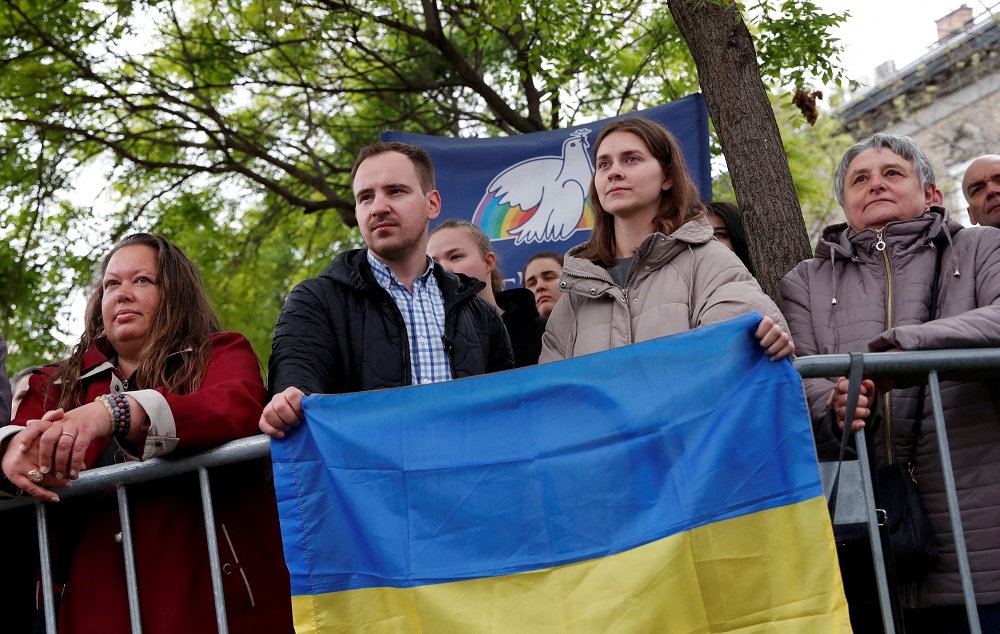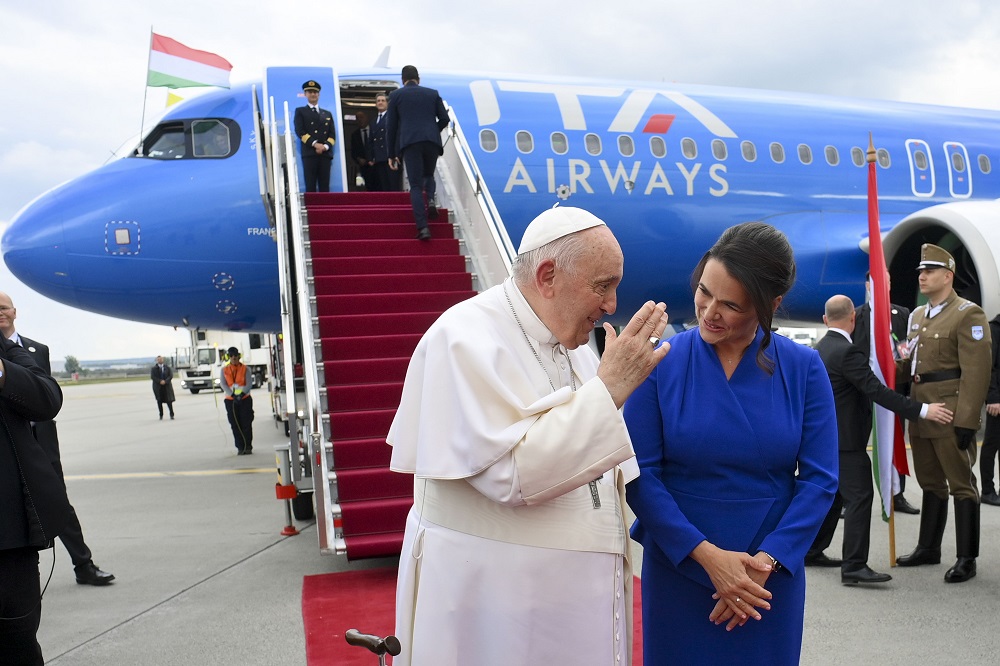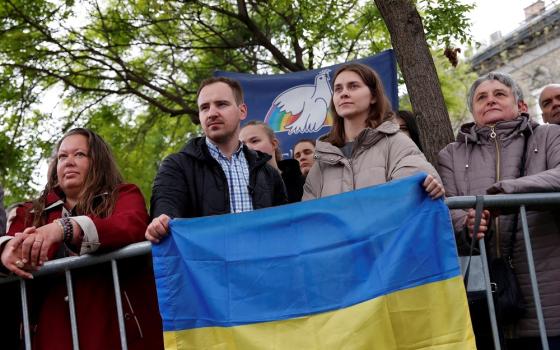
Ukrainians hold the Ukrainian flag at the Church of Saint Elizabeth of Hungary as Pope Francis meets with the poor and with refugees during his apostolic journey in Budapest, Hungary, April 29, 2023. (OSV News/Bernadett Szabo, Reuters)
Pope Francis said he is working behind the scenes in Hungary to bring peace to Ukraine and that the Vatican is willing to help with a request from Ukraine's prime minister to mediate the return of Ukrainian children forcibly taken to Russia since the outbreak of war over a year ago.
While saying he needed to be discreet, the pope said there are plans underway, including with individuals he met during his three-day stay in Hungary, to aid in his efforts to encourage peace in Europe.
"We must help so this doesn't become a justification for war," the pope said April 30 during a press conference on board the papal plane. "All humanitarian gestures help. Gestures of cruelty do not help."
The pope noted that the Vatican had already successfully helped to mediate a prisoner exchange between Russians and Ukrainians.
On April 27, the pope met with Ukrainian Prime Minister Denys Shmyhal, who told reporters that he believed the Vatican could play an important role in what is believed to be thousands of Ukrainian children taken from their homeland.
The pope's remarks came on the return flight to Rome after a delicate trip to the Hungarian capital of Budapest — a visit where he made repeated calls for an end to war and calling on Europe to unite together in hopes of peace.
Advertisement
On April 29, the pope held a private meeting with Metropolitan Hilarion, who from 2009-2022 served as foreign minister for the Russian Orthodox Church. Last summer, Hilarion was dismissed from the role, due to what is widely believed to be his more cautious stance on Russia's war against Ukraine than that of Russian Orthodox Patriarch Kirill.
The Vatican was tight-lipped about the pope and Hilarion's 20-minute meeting, only noting that it was cordial.
Francis was equally cautious speaking to reporters en route back to Rome, only saying "you can imagine we did speak about this," referring to the war.
The pope went on to praise Hilarion as "very intelligent" and "someone with whom one can talk."
It is "always good to open channels" said the pope, adding that "you can't have peace with closed doors."
Francis said that he had only spoken with Kirill once since the war, but that he believes "everyone is interested in finding a path to peace."

Pope Francis speaks with Hungarian President Katalin Novák during a farewell ceremony in Budapest, Hungary, April 30, 2023. The pontiff concluded his three-day visit to the country. (CNS/Vatican Media)
On another sensitive geopolitical issue, the pope said that following last month's return of fragments from the Parthenon from the Vatican Museums to Greece, that he remains open to making other acts of restitution.
"If you stole, you have to give back," he said. "What I did was the right thing to do."
The pope noted that sometimes it can be politically or realistically difficult to navigate such demands, but "if a gesture is necessary, it's best to do it."
"If tomorrow, the Egyptians ask us to give them back the obelisk, what are we going to do?" he asked rhetorically in reference to the monument in St. Peter's Square.
Still, the pope said previous acts of restitution have proven to be "very fruitful" and that he was aware that the Jesuits in the United States are working on restitution efforts involving Indigenous peoples.
"You must never put your hand in the pockets of others," he said.
The 86-year-old Francis, who was hospitalized in late March for three days with bronchitis, said that despite having recent health set-backs, he intends to travel to Portugal in August for World Youth Day, along with upcoming trips to Mongolia and France.
When he first entered the hospital, the Vatican said the pope was there for "previously planned tests," before having to backtrack after it was reported that Francis was rushed there in an ambulance.
During the 20-minute on-board press conference, the pope provided a few more details on what led to his hospitalization, saying that after his Wednesday general audience on March 29, he had a high fever. After lunch, he said, he took a nap before his doctor ordered him to go to the hospital.
"I did not lose my senses," the pope said, seeming to contradict reports that surfaced earlier this month claiming that Francis had told an Italian man whom he speaks with regularly that he had arrived at Rome's Gemelli hospital unconscious.
Traveling — and getting out of the Vatican, he said — "keeps me active."





